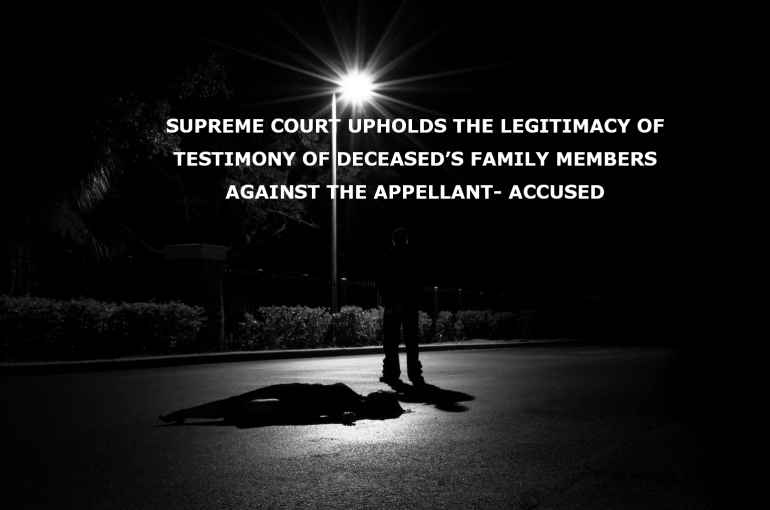SUPREME COURT UPHOLDS THE LEGITIMACY OF TESTIMONY OF DECEASED’S FAMILY MEMBERS AGAINST THE APPELLANT- ACCUSED
In a recent case of Haalesh vs. State of Karnataka, Criminal Appeal No.1954 of 2012 and other connected matters, a two Judge Bench of the Supreme Court comprising of Justice Abhay S. Oka and Justice Pankaj Mithal passed a Judgment dated 02-02-2024 and upheld the genuineness of the testimonies / evidence of the family members and interested persons of the Deceased against the Accused persons.
Facts
i) In the present case, there were alleged property related disputes between the Deceased-Shivanna and the Accused- Ramanna, wherein, the Civil Court had passed a decree in favor of the Deceased and the said decree was under execution. On 25-09-1999, around 09.15 am, the Accused persons had unlawfully assembled at the Deceased’s house, armed with deadly weapons with the common object of killing the Deceased and his family members. The Accused assaulted the Deceased, his Wife and Daughter. The Deceased succumbed to his injuries, whereas his Wife and Daughter survived their injuries.
ii) The case was committed to the Ld. Principal Sessions Judge, Shimoga, Karnataka (Trial Court) in Sessions Case No. 25 / 2000, which passed an Order dated 22-11-2006 and convicted 7 out of 9 Accused persons for various offences, on the basis of the eye-witness testimonies of the injured Wife and Daughter of the Deceased. The Accused No. 1 to 7 were sentenced to undergo imprisonment for different periods with a maximum of life imprisonment for an offence under Section 302 of the Indian Penal Code 1860 (IPC) (Punishment for murder) in aid with Section 149 IPC (Every member of unlawful assembly guilty of offence committed in prosecution of common object).
iii) Aggrieved by the Trial Court Order of Conviction dated 22-11-2006, the Accused No. 4-6 together filed a Criminal Appeal No. 219 / 2007 and the Accused No. 7 separately filed a Criminal Appeal No. 229 / 2007 before the Hon’ble High Court of Karnataka.
iv) The High Court passed a Common Order dated 01-07-2010 and upheld the Trial Court Order of Conviction dated 22-11-2006.
Supreme Court Observations
Aggrieved by the High Court Order dated 01-07-2010, the Accused No. 4-5 together filed Criminal Appeal No.1955 of 2012, the Accused No. 7 separately filed a Criminal Appeal No.1954 of 2012 and later, the Accused No. 6 filed a Criminal Appeal No. 1303 of 2014 before the Hon’ble Supreme Court. The Apex Court, vide Common Order dated 02-02-2024, made the following observations:
1) That the conviction was based solely on the eye-witness testimonies of the Deceased’s Wife and Daughter, who were present at the crime scene at the time of commission of offence by the Accused. The Deceased’s wife testified that there were bitter disputes between the Deceased and his elder brother i.e. the Accused No. 9 with regard to a family property. The Accused No. 6 had come to their house a day before the incident and gave them death threats.
2) That as per the version of all the Prosecution Witnesses, the Accused persons had assembled at the Deceased’s house armed with dangerous weapons and trespassed the Deceased’s house. The Accused 1-7 had all indulged in assaulting one or the other members of the Deceased’s family with the weapons in their hand. Hence, the Bench held that the provisions of Section 149 IPC have been rightly applied against the Accused persons and further observed as follows:
“A plain reading of the above provision abundantly makes clear that an overt act of some of the accused persons of an unlawful assembly with the common object to kill the deceased Shivanna and to cause grievous hurt to the other family members is enough to rope in all of them for an offence under Section 302 IPC in aid with Section 149 IPC.”
3) Further, the Post-Mortem Report produced by the Doctor also proved the injuries found on the Deceased’s body and that all the wounds have been caused by the same kind of weapons, which matched the version of the Prosecution Witnesses that stated that the Accused persons used choppers to attack the Deceased and the family members.
4) Thus, the Bench held as follows:
“No doubt, they are members of the family and may be interested persons but their testimony cannot be discarded simply for the reason that they are family members in the scenario of the case that the incident took place inside the house of the deceased Shivanna, where there could not have been any other eyewitnesses other than the family members. The evidence of the aforesaid two eyewitnesses could not be shaken in the cross-examination. Thus, we do not find any illegality on part of the courts below in holding the appellants guilty and to convict them.”
Conclusion
Therefore, based on the aforesaid observations, the Supreme Court held that as there were no contradictions in the versions of the Prosecution Witnesses, supported by the medical evidence, hence, there is no scope of interference with the High Court Order dated 01-07-2010 that upheld the Order of Conviction of the Trial Court dated 22-11-2006 against the Accused persons. As a result, the Appeals were dismissed.
Harini Daliparthy
Senior Associate
The Indian Lawyer





































Leave a Reply